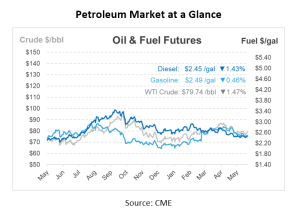
What’s That: City of Portland Renewable Fuel Standard
The City of Portland, Oregon, recently adopted amendments to its Renewable Fuel Standard (RFS), which took effect on May 15, 2024. Today, we’re exploring the mandate, a sustainable policy shift that aims to reduce carbon emissions and promote the use of cleaner, renewable sources of energy in the city’s transportation sector.
What is the City of Portland Renewable Fuel Standard?
The City of Portland Renewable Fuel Standard is a local regulatory framework designed to increase the use of renewable fuels in transportation, thereby reducing greenhouse gas emissions and improving air quality. The RFS mandates that a certain percentage of the fuel sold within the city must come from renewable sources, such as biofuels (e.g., biodiesel and ethanol) and other non-fossil sources.
Specifically, these amendments mandate that all diesel fuel sold by fuel distributors or resellers to fuel retailers, nonretail dealers, or wholesale purchaser-consumers within the city shall contain a minimum blend of 15% biodiesel or renewable diesel. A phased increase in biofuel blending ratios for diesel will culminate in a 99% Renewable Diesel (R99) or Biodiesel blend requirement by 2030.
Typically, RFS policies are enacted at the state level, making Portland’s city-level initiative a pioneering move. This approach highlights Portland’s commitment to environmental leadership and sets a precedent for other cities. By implementing its own RFS, Portland may inspire a domino effect, encouraging other municipalities to adopt stricter sustainability measures and tailor renewable fuel policies to their specific urban contexts. This trend could accelerate the overall shift towards renewable fuels, as cities play an increasingly active role in national and global efforts to combat climate change.
Summary of the Policy
The Portland RFS outlines specific mandates for fuel suppliers, such as gas stations and fuel distribution centers, to incorporate renewable fuels with conventional gasoline and diesel. The policy is structured around several key components. First, it establishes minimum blending thresholds, requiring suppliers to mix a certain percentage of renewable fuels with traditional fuels. This percentage is set to gradually increase over time, facilitating a shift toward cleaner energy sources.
The policy introduces a credit system that allows suppliers to earn credits if they exceed these minimum blending requirements. These credits can be traded or saved for future use, providing flexibility in how suppliers fulfill their obligations. Finally, the city is responsible for monitoring compliance with these standards through required reporting from fuel suppliers. To enforce this policy, the city will impose penalties on those who fail to comply, ensuring that the standards are met effectively.
Reporting Requirements
Under the City of Portland RFS, the responsibility for adhering to reporting requirements rests squarely with fuel distributors, not customers. Distributors are required to register with the city, providing initial data on their fuel types and volumes. After this initial phase, they must submit annual reports detailing compliance with the mandated blending thresholds. These reports are crucial for the city to monitor adherence to the RFS and assess the policy’s overall impact on reducing carbon emissions. This structured approach ensures that the administrative burden of the RFS falls on the suppliers, allowing consumers to benefit from cleaner fuel without navigating the complexities of compliance and reporting.
B15 Blend or R99: Which is Better?
While a B15 blend, which contains 15% biodiesel, would meet the initial increased biofuel blending requirements set for 2024, it would not be sufficient to meet the city’s 2026 mandate of a 50% blend of biodiesel or renewable diesel or the 2030 mandate of 99% biodiesel or renewable diesel. Opting for R99 from the start enables customers to meet their immediate regulatory requirements and the most stringent future requirements immediately. This ensures long-term compliance without further changes and reflects a commitment to environmental sustainability. R99 enables customers to benefit from a cleaner, more efficient fuel that aligns with the latest Carbon Intensity (CI) standards. Choosing R99 directly saves resources and reduces the complexity associated with subsequent fuel transitions.
As a leading supplier of renewable fuels, Mansfield has conducted research to ensure that our choice of supplying customers within the city limits of Portland with R99 complies with current regulations and positions our customers and us for future compliance without further adjustments. By converting to R99 now, we save you the hassle of future fuel transitions and help streamline your operations in adherence to local laws.

This article is part of Daily Market News & Insights
Tagged: City of Portland, Renewable Fuel Standard
MARKET CONDITION REPORT - DISCLAIMER
The information contained herein is derived from sources believed to be reliable; however, this information is not guaranteed as to its accuracy or completeness. Furthermore, no responsibility is assumed for use of this material and no express or implied warranties or guarantees are made. This material and any view or comment expressed herein are provided for informational purposes only and should not be construed in any way as an inducement or recommendation to buy or sell products, commodity futures or options contracts.





